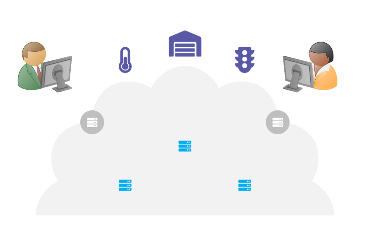
INPUT: In-Network Programmability for next-generation personal cloUd service supporT
-
START DATE
1 Jan, 2015
-
END DATE
31 Dec, 2017
-
FUNDED BY
H2020-EU.2.1.1.3.
DETAILS
The project consortium was led by Consorzio Nazionale Interuniversitario Per Le Telecomunicazioni, Italy (CNET) and funded by Horizon 2020 under Grant Agreement 644672.
The project goals were:
The INPUT Project aims at designing a novel infrastructure and paradigm to support Future Internet personal cloud services in a more scalable and sustainable way and with innovative added-value capabilities. The INPUT technologies will enable next-generation cloud applications to go beyond classical service models, and even to replace physical Smart Devices, usually placed in users’ homes (e.g. set-top-boxes, etc.) or deployed around for monitoring purposes (e.g. sensors), with their virtual images, providing them to users “as a Service.” Virtual and physical SDs will be made available to users at any time and at any place by means of virtual cloud-powered Personal Networks, which will constitute an underlying service model. These Personal Networks will provide users the perception to be always in their home LAN with their own smart digital (virtual and physical) devices.
The DCU contribution was to develop a programmable OpenFlow/SDN switch on the NetFPGA platform and to integrate it into the wider INPUT architecture. We incorporated energy management features into our design to demonstrate the feasibility of adapting edge device capabilities to maximise energy efficiency.
More information on Cordis
Project Website: input-project.eu
Students(s): Pengcheng Liu
Staff: Saqib Rasool Chaudhry
Intern(s): Li Li (2016)
Publications
- Hierarchical Power Management Architecture and the Optimal Local Control Policy for Energy Efficient Networks Author(s): Y. Wei, X. Wang, L. Fialho, R. Bruschi, O. Ormond, Collier, Martin Published in: Journal of Communications and Networks, 2016, Page(s) 540-550, ISSN 1229-2370 Publisher: Korean Institute of Communication Sciences
- Traffic Aware Energy Efficient Router: Architecture, Prototype and Algorithms Author(s): Tian Song, Zheng Jiang, Yu Wei, Xiangjun Shi, Xiaowei Ma, Olga Ormond, Martin Collier, Xiaojun Wang Published in: IEEE Journal on Selected Areas in Communications, 34/12, 2016, Page(s) 3814-3827, ISSN 0733-8716 Publisher: Institute of Electrical and Electronics Engineers DOI: 10.1109/jsac.2016.2600063
- A programmable energy efficient 40 Gb/s switch using frequency scaling and OpenFlow Author(s): Pengcheng Liu, Ali Ghiasian, Xiaojun Wang, Martin Collier Published in: 2017 IEEE International Conference on Communications Workshops (ICC Workshops), 2017, Page(s) 405-410, ISBN 978-1-5090-1525-2 Publisher: IEEE DOI: 10.1109/iccw.2017.7962691
- Flow-table Updating Strategy for Efficient Use of Renewable Energy in Software Defined Wireless Relay Networks Author(s): Li Li, Yifei Wei, Mei Song, Xiaojun Wang Published in: Journal of Communications and Networks, 2017, Page(s) 605-617, ISSN 1229-2370 Publisher: Korean Institute of Communication Sciences
- Liu, Pengcheng, Saqib Rasool Chaudhry, Tao Huang, Xiaojun Wang, and Martin Collier. “Multi-factorial energy aware resource management in edge networks.” IEEE Transactions on Green Communications and Networking vol. 3, no. 1 (2018)pp. 45-56.
- Liu, Pengcheng, Saqib Rasool Chaudhry, Xiaojun Wang, and Martin Collier. “PROGRES: a programmable green router with controlled service rate.” IEEE Access 7 (2019): 143792-143804.
- Liu, P , Wang, X., Chaudhry, S. R., Javeed, J., Ma, Y., Collier, M., “Secure Video Streaming with Lightweight Cipher PRESENT in an SDN Testbed”, Computers, Materials and Continua (CMC), vol.57, no.3, pp.353-363, 2018.



